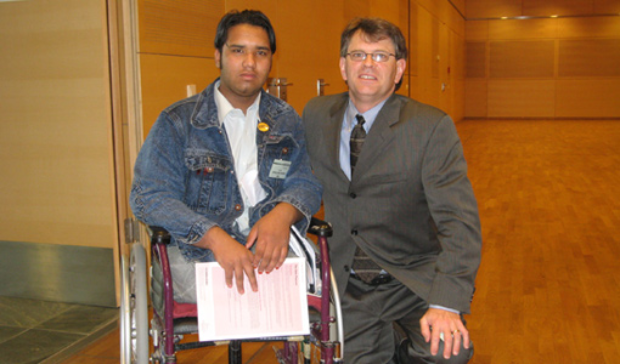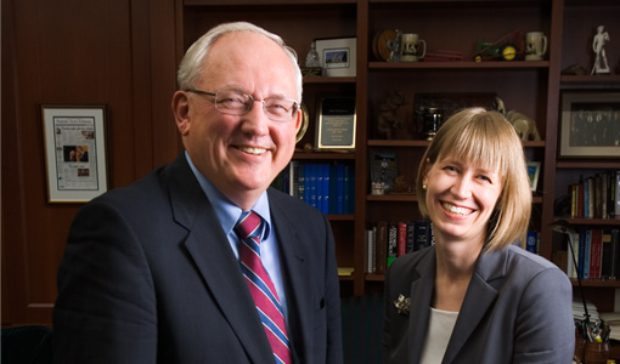Raed Mokaled of Lebanon and Soraj Ghulam Habib of Afghanistan had their lives changed forever by unexploded cluster munitions.
Cluster munitions can be delivered by artillery, rockets or planes. They open in mid-air, scattering dozens or even hundreds of smaller bomblets over areas as large as several football fields. Many bomblets “dud” – do not explode immediately – and remain a threat for years. Children are at particular risk because they often mistake the explosives – ranging in shape from a tennis ball to a brightly colored soda can – for toys or other objects.
Raed's son, Ahmad, was killed at his fifth birthday picnic party in 1999 in South Lebanon. At a park, Ahmed was killed by an unexploded bomblet dropped before he was even born. In 2001, 10-year-old Soraj was also at a picnic in a park near his home in Afghanistan. He thought the bomblet he found contained food and tried to open it. The resulting explosion killed his cousin, injured three others, and took both of Soraj’s legs. Soraj’s father stopped doctors from euthanizing Soraj.
The BLU-97 bomblet that wreaked such havoc on Soraj and his family likely was manufactured by Alliant Techsystems, based in Minnesota. Alliant Tech’s response to these sorts of humanitarian concerns? A sort of corporate shrug – they have moved on to other things, not having made the bombs since 1995. Our government mandates recalls of lead-laden toys made in China on the one hand, while on the other hand providing air-tight legal protections to the makers of defective but deadly weapons that kill years after a conflict is over.
What happened to Raed and Soraj is as predictable as the tides, and so is the message the two men now carry to governments around the world: Use cluster munitions today, kill and maim civilians tomorrow.
Witness in Lebanon
Last April, I toured southern Lebanon and saw firsthand the lasting damage done by widespread cluster bomb use and the courageous and dangerous efforts being made to clear unexploded ordnance. In addition to putting civilians at risk of immediate death and injury, cluster bombs also deny access to homes, schools, agricultural land and grazing areas.
At least one U.S. commander declined to use similar U.S. weapons in urban combat in Iraq, because of the dangers of unexploded bomblets. In conflict after conflict during the past 40 years, the immediate and long-term impacts of using cluster munitions have become horrifyingly clear. From Laos, to the Falkland Islands, to Chechnya, to Iraq in 1991, to Kosovo, to Iraq in 2003, these weapons have gained a reputation for dealing death and destruction to civilians both during fighting and long after the shooting stops.
Working for a ban
Why have cluster bombs not been banned? Past efforts were met with opposition from powerful countries who see the weapons as useful, as well as by promises that the weapons could be improved to reduce their threat to civilians. Now momentum is gathering for a ban of these weapons.
Congress recently enacted a one-year moratorium on the export of unreliable cluster munitions. That should be made permanent. Another modest bill in Congress would do that and also attempt to prevent the use of cluster bombs in civilian-populated areas. The bill is not perfect, as manufacturer guarantees about dud rates have never been fulfilled in the past. Nevertheless, it is a step toward reducing the humanitarian threat.
In 1995, I was in Vienna as one of only a handful of people pushing for cluster bombs to be banned along with landmines. That effort failed, but has resurfaced as a result of ongoing tragedies and new wars. In December 2007, I was in Vienna again and witnessed delegates from 138 countries working toward a ban on cluster munitions. (Sadly, the U.S. was not there).
Young Soraj Habib’s words, spoken in Vienna to government delegates, still ring in my ears: “Stop killing civilians; stop killing the futures of children.”
Author: Virgil Wiebe is associate professor of law at the University of St. Thomas School of Law and a consultant to the Mennonite Central Committee. He also is a board member of the Mines Advisory Group America, an organization dedicated to clearing unexploded ordnance from battlefields.





